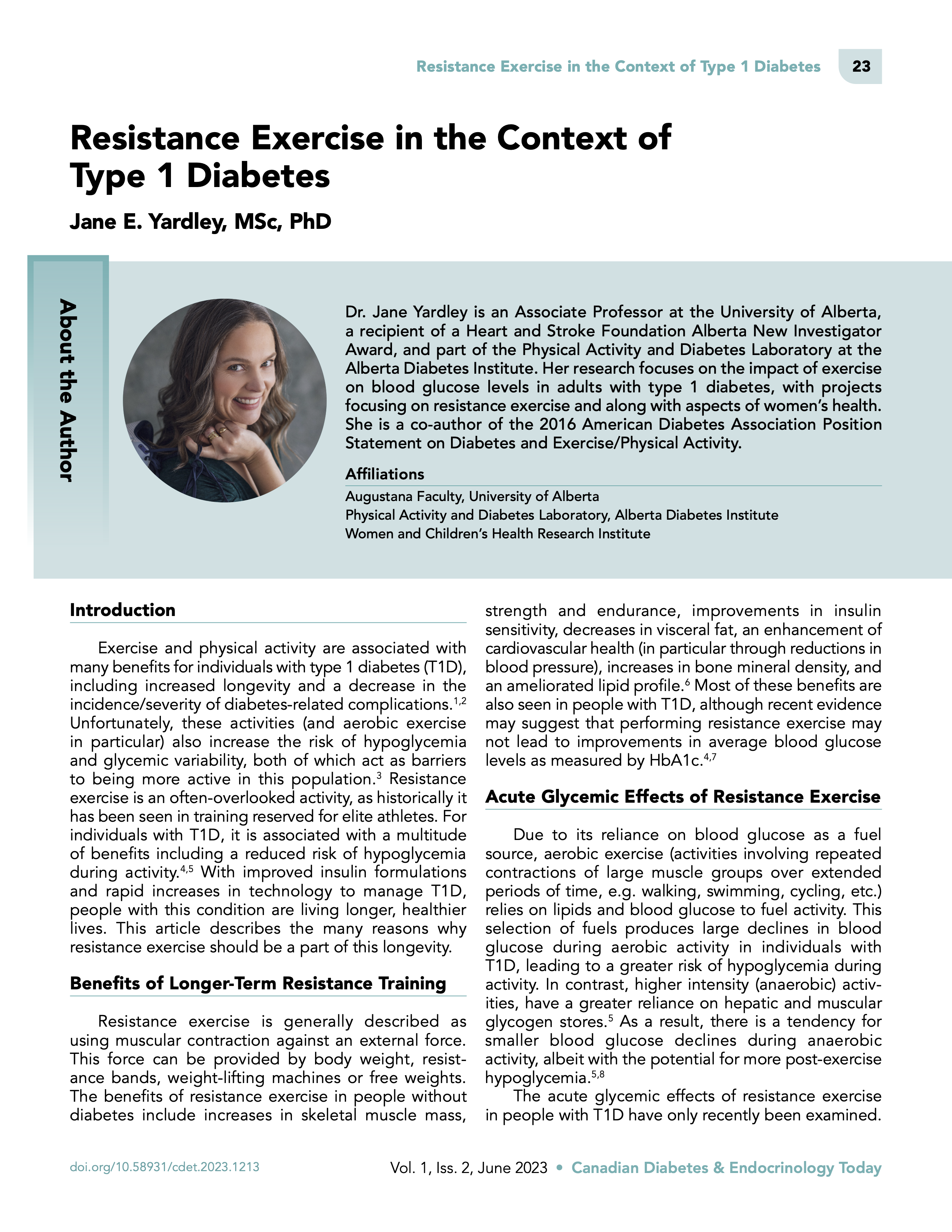Resistance Exercise in the Context of Type 1 Diabetes
DOI:
https://doi.org/10.58931/cdet.2023.1213Abstract
Exercise and physical activity are associated with many benefits for individuals with type 1 diabetes (T1D), including increased longevity and a decrease in the incidence/severity of diabetes-related complications. Unfortunately, these activities (and aerobic exercise in particular) also increase the risk of hypoglycemia and glycemic variability, both of which act as barriers to being more active in this population. Resistance exercise is an often-overlooked activity, as historically it has been seen in training reserved for elite athletes. For individuals with T1D, it is associated with a multitude of benefits including a reduced risk of hypoglycemia during activity. With improved insulin formulations and rapid increases in technology to manage T1D, people with this condition are living longer, healthier lives. This article describes the many reasons why resistance exercise should be a part of this longevity.
References
Moy CS, Songer TJ, LaPorte RE et al. Insulin-dependent diabetes mellitus, physical activity, and death. Am J Epidemiol. 1993;137:74-81. DOI: https://doi.org/10.1093/oxfordjournals.aje.a116604
Pongrac Barlovic D, Harjutsalo V, Groop PH. Exercise and nutrition in type 1 diabetes: Insights from the FinnDiane cohort. Front Endocrinol (Lausanne). 2022;13:1064185. DOI: https://doi.org/10.3389/fendo.2022.1064185
Brazeau AS, Rabasa-Lhoret R, Strychar I, Mircescu H. Barriers to physical activity among patients with type 1 diabetes. Diabetes Care. 2008;31:2108-2109. DOI: https://doi.org/10.2337/dc08-0720
McCarthy O, Moser O, Eckstein ML et al. Resistance isn’t futile: The physiological basis of the health effects of resistance exercise in individuals with type 1 diabetes. Front Endocrinol (Lausanne). 2019;10:507. DOI: https://doi.org/10.3389/fendo.2019.00507
Yardley JE, Kenny GP, Perkins BA et al. Resistance versus aerobic exercise: acute effects on glycemia in type 1 diabetes. Diabetes Care. 2013;36:537-542. DOI: https://doi.org/10.2337/dc12-0963
Westcott WL. Resistance training is medicine: effects of strength training on health. Curr Sports Med Rep. 2012;11:209-216. DOI: https://doi.org/10.1249/JSR.0b013e31825dabb8
Sigal RJ, Yardley JE, Perkins BA et al. The Resistance Exercise in Already Active Diabetic Individuals (READI) randomised clinical trial. J Clin Endocrinol Metab. 2022. In press.
Rempel M, Yardley JE, MacIntosh A et al. Vigorous intervals and hypoglycemia in type 1 diabetes: A randomized cross over trial. Sci Rep 2018;8:15879. DOI: https://doi.org/10.1038/s41598-018-34342-6
Turner D, Luzio S, Gray BJ et al. Impact of single and multiple sets of resistance exercise in type 1 diabetes. Scand J Med Sci Sports. 2015;25:e99-109. DOI: https://doi.org/10.1111/sms.12202
Toghi-Eshghi SR, Yardley JE. Morning (fasting) vs afternoon resistance exercise in individuals with type 1 diabetes: A randomized crossover study. J Clin Endocrinol Metab. 2019;104:5217-5224. DOI: https://doi.org/10.1210/jc.2018-02384
Yardley JE. Reassessing the evidence: prandial state dictates glycaemic responses to exercise in individuals with type 1 diabetes to a greater extent than intensity. Diabetologia. 2022;65(12):1994-1999. DOI: https://doi.org/10.1007/s00125-022-05781-8
Yardley JE, Kenny GP, Perkins BA et al. Effects of performing resistance exercise before versus after aerobic exercise on glycemia in type 1 diabetes. Diabetes Care. 2012;35:669-75. DOI: https://doi.org/10.2337/dc11-1844
Brockman NK, Sigal RJ, Kenny GP, Riddell MC, Perkins BA, Yardley JE. Sex-related differences in blood glucose responses to resistance exercise in adults with type 1 diabetes: A secondary data analysis. Can J Diabetes. 2020;44:267-273 e1. DOI: https://doi.org/10.1016/j.jcjd.2019.08.006
Prevost MS, Rabasa-Lhoret R, Talbo MK, Yardley JE, Curry EG, Brazeau AS. Gender differences in strategies to prevent physical activity-related hypoglycemia in patients with type 1 diabetes: A BETTER study. Diabetes Care. 2022;45:e51-e53. DOI: https://doi.org/10.2337/dc21-1899
Dial AG, Monaco CMF, Grafham GK, Patel TP, Tarnopolsky MA, Hawke TJ. Impaired function and altered morphology in the skeletal muscles of adult men and women with type 1 diabetes. J Clin Endocrinol Metab. 2021;106:2405-2422. DOI: https://doi.org/10.1210/clinem/dgab261
Vilaca T, Schini M, Harnan S et al. The risk of hip and non-vertebral fractures in type 1 and type 2 diabetes: A systematic review and meta-analysis update. Bone. 2020;137:115457. DOI: https://doi.org/10.1016/j.bone.2020.115457
Fyfe JJ, Hamilton DL, Daly RM. Minimal-dose resistance training for improving muscle mass, strength, and function: A narrative review of current evidence and practical considerations. Sports Med. 2022;52:463-79. DOI: https://doi.org/10.1007/s40279-021-01605-8
Cauley JA, Giangregorio L. Physical activity and skeletal health in adults. Lancet Diabetes Endocrinol. 2020;8:150-62. DOI: https://doi.org/10.1016/S2213-8587(19)30351-1
Peterson MD, Rhea MR, Sen A, Gordon PM. Resistance exercise for muscular strength in older adults: a meta-analysis. Ageing Res Rev. 2010;9:226-237. DOI: https://doi.org/10.1016/j.arr.2010.03.004
Yardley JE, Brockman NK, Bracken RM. Could age, sex and physical fitness affect blood glucose responses to exercise in type 1 diabetes? Front Endocrinol (Lausanne). 2018;9:674. DOI: https://doi.org/10.3389/fendo.2018.00674

Published
How to Cite
Issue
Section
License
Copyright (c) 2023 Canadian Diabetes & Endocrinology Today

This work is licensed under a Creative Commons Attribution-NonCommercial-NoDerivatives 4.0 International License.
